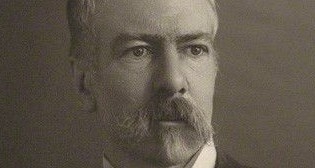CC Massey (1838–1905) was an English barrister, Theosophist, and founding member of the Society for Psychical Research.
Contents
Life and Career
Charles Carleton Massey1Not to be confused with the spiritualist poet and theologian Gerald Massey (1828–1907). was born at Hackwood Park, Basingstoke, on 23 December 1838. He received his certificate to practice as barrister-at-law from the Westminster School. From 1865 to 1868 he gained prominence as a lawyer, dedicating himself mainly to politics, legislative debates, and learning French and German.
After reading Swedenborg and similar authors he decided to devote his life to the investigation of metaphysics, psychical phenomena, the philosophy of religion, and mysticism.2Barrett (1905). Oppenheim (1985), 30-32. In 1875 he visited New York and there became a fellow of the Theosophical Society. Along with his friend Henry Olcott, a Theosophist leader, he attended sittings with the medium Henry Slade and in 1876 joined the committee set up to defend him in the court case brought against him in the UK.3E.K. (1905). He attended séances held in America by the Eddy Brothers and other mediums.
In 1878 Massey became the first president of the London Branch of the Theosophical Society. He resigned in 1883 after discovering that its founder Helena Blavatsky had engaged in fraud.4Lavoie (2012), 73-74. He was also a member of the British National Association of Spiritualists, the London Dialectical Society and the Psychological Society. He was a founder of the Society for Psychical Research and member of its council from 1882 to 1886, resigning over controversies regarding the medium William Eglinton.5Gauld (1968), 138; Lavoie (2014), 22-23. In 1885 he collaborated with Richard Hodgson in exposing fraud by Blavatsky. Although not an active member, he maintained close relations with the SPR, where his abilities and character were highly appreciated.
Massey died on 29 March 1905.6Barrett (1905), 95; Lavoie (2012), 76.
Views on Psychical Research
From his early encounters with Spiritualism and Theosophy, Massey developed eclectic opinions concerning the teachings of spiritual beings. After leaving the Theosophical movement, his interest in esoteric questions gradually diminished, but he continued to pay attention to the scientific research of psi and survival.7Lavoie (2014), 17-19. He held that mediumistic phenomena were real, citing testimony of sittings with William Eglinton and Henry Slade, including endorsements by conjurers. In this he clashed with Henry Sidgwick, a co-founder of the SPR and its first president, and Sidgwick’s wife Eleanor, along with some other senior SPR members, who considered these and other physical mediums to be fraudulent.8Massey (1887b).
Massey stressed the logical difficulties that a person encounters when confronted with testimony of a paranormal event.He wrote: ‘When we see how a thing can have happened, we are much more ready to give a fair hearing to evidence that it has happened, than when the material offered is quite indigestible by our intelligence. And thus an explanatory hypothesis is hardly less necessary for the reception of facts of a certain character, than are facts for the support of a hypothesis’.9Massey in Du Prel (1889), vol. I, xv-xvi. See also Massey in Zöllner (1880), Appendix A, 237-58; Massey (1887a); and Massey (1887b), where he debates certain positions of Eleanor Sidgwick.
He also argued that to research mediumship scientifically required one to accept the existence of an ‘organic threshold of consciousness’ that is in constant operation. An investigation of evidence suggestive of postmortem survival, for example, must set out from the belief that death is not a mere change of external conditions – the conventional spiritualist view at the time – but a continuity of consciousness ‘of the same levels and modes.’ In other words, to die does not mean that one becomes disembodied and then jumps into some higher sphere of consciousness; rather, it means one recognizes ‘a nature beneath the surface with which our senses connect us’.10Massey in Von Hartmann (1885), x.
Massey published exclusively in magazines and journals such as Light, the Psychological Review, and the SPR Proceedings. Some of his most interesting contributions can be found as prefaces and appendices to his English translations of German authors.
Works
Books
Barrett, W.F. (ed.). (1901). Thoughts of a Modern Mystic. A Selection from the Writings of the Late C. C. Massey, London, Kegan Paul, Trench, Trübner.
Massey, C.C. (1876). Spiritualism and men of science. The Spiritualist 207/9, August 11, 21-22.
Massey, C.C. (1887a). The application to spiritualism of scientific research. Light 318/7, February 5, 62-64.
Massey, C.C. (1887b). The possibilities of mal-observation in relation to evidence for the phenomena of spiritualism. Proceedings of the Society for Psychical Research: 1886-1887. London: Trübner and Co., Ludgate Hill, 75-98.
Prefaces to Translated Works
Du Prel, C. (1889). The Philosophy of Mysticism (2 vols), London: George Redway.
Von Hartmann, E. (1885). Spiritism. London: The Psychological Press (reprinted from Light).
Zöllner, J.C.F. (1880). Transcendental Physics: An Account of Experimental Investigations, from the Scientific Treatises. London, W. H. Harrison.
Roberto R Narváez
Literature
Barrett, W. (1905). Obituary: C.C. Massey. Journal of the Society for Psychical Research 12, 95-99.
E.K. (1905). Mr. C.C. Massey – In memoriam. Light 25, April 15, 178.
Gauld, A. (1968). The Founders of Psychical Research. London: Routledge & Kegan Paul.
Lavoie, J. (2012). The Theosophical Society. The History of a Spiritual Movement. Boca Raton, Florida, USA: Brown Walker Press.
Lavoie, J. (2014). A Search for Meaning in Victorian Religion: The Spiritual Journey and Esoteric Teachings of Charles Carleton Massey. London: Lehigh University Press.
Oppenheim, J. (1985). The Other World. Spiritualism and Psychical Research in England, 1850-1914. Cambridge, UK: Cambridge University Press.
Sargent, E. (1881). The Scientific Basis of Spiritualism (2nd ed.). Boston: Colby and Rich.
